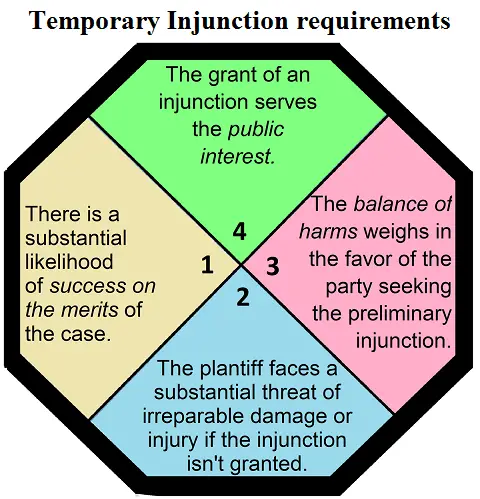
Meaning of temporary injunction and how is it different from stay order
Temporary injunction is also a kind of interim order which is made by the court for the basic purpose of granting a relief to the aggrieved or to the person who is dispossessed of something which would cause him harm or loss till the pendency of the suit. To understand this concept better, an illustration is made. A is a person against whom a suit is filed for the possession of a scooter which is also the subject matter of dispute. Such a scooter was used by A in routine for his travelling for work, absence of which is now causing him great difficulty and loss. The court may pass an interim order so that A could use that scooter till the final judgement is passed by the court and this order is a temporary injunction. It must be noted that all interim orders are of different nature, kind and duration.
As it is pointed out that the jurisprudential approach behind such order is to grant an aid and provided an ancillary to main relief available to the party on the final determination of the suit. Such can be provided in terms of a temporary injunction. It is, in simple words, a judicial process whereby a party is either required to do a particular act or refrain from doing a particular act is called an injunction. It has been observe that the object of an order regarding interim relief is to evoke a workable formula to the extend call for by the demands of the situation, keeping in mind the pros and cons of the matter and striking a delicate balance between two conflicting interests, i.e., injury and prejudice, likely to be caused to the plaintiff if the relief is refused and to the defendant if the relief is granted.[1]
Oder XXXIX of the Civil Procedure Code, 1908 provides for temporary injunction and provides that both plaintiff and defendant can apply for injunction against each other if the following grounds exist. Where any property in dispute in a suit is in danger of being wasted, damaged or alienated by any party to the suit, or wrongfully sold in execution of a decree or where a defendant threatens, or intends to remove or dispose of his property with a view to defrauding his creditors or where a defendant threatens to dispose the plaintiff or otherwise cause injury to the plaintiff in relation to any property in dispute in the suit or where a defendant is about to commit a breach of contract or any other kind of injury, application for temporary injunction can be made. It is further provided under section 94(c) that where a court is of opinion that the interests of justice so require, an order for temporary injunction can be made.
Talking in terms of stay order, it basically means stopping a judicial proceeding to further proceed. It is addressed to the court and non contravention to this order or non compliance thereto has an effect of nullity. Therefore, if court proceeds further even after being addressed to stay, such proceeding of the court will be null and void. It is to be kept in mind that the stay order becomes effective when and only it is communicated to the ocurt to which it is issued.[2]
For an injunction, the most important thing which must be established is that the case must be a prima facie case meaning thereby the relief so claimed by the party must be a bona fide one. Similarly, it must also be proved to the satisfaction of the court that had no order of temporary injunction is passed there will be an irreparable injury to the subject matter of the court. It is equally paramount for the court to consider the principle what is likely to be known ad balance of convenience and inconvenience that is to say that court has to consider that the refusal of an order of injunction might lead to more inconvenience to the party making application for it than the party to whom such relief is granted. These three features are necessitated the court to scrutinise peculiarly the circumstances of the case and it also serves a point of difference with the stay order which has no such peculiarity.
There are certain orders of injunctions which are not allowed to be granted which cause administrative inconvenience or public mischief. These can be illustrated in terms of application of injunction for recovery of tax or transfer of employees or suspension of employees, etc. Injunctions which can be granted therefore may be of nature of appointment of a receiver or commission or attachment or transfer of property whereas there is no such restriction on order of stay.
It is also provided that the effects of non compliance to the order of injunction may ranges from consequences as harsh as contempt of court. Since party has to obey to the order of injunction, unless if that party feels it is not in accordance with law, such steps shall be taken in compliance to the rules and provisions related thereto for their reversal or medication. The consequence of contempt of court may also be in terms of an injunction itself, or fine or even imprisonment. On the other hand, if a difference is to be drawn on lines of point of non compliance, it is already discussed that a order of stay if not complied with, will have an effect of nullity as if no further proceeding or execution or any other decision taken by court was ever held.
This given images very nicely concludes the requirements for granting temporary injunction which judicial authorities have to follow. If any case fulfill all the said requirements than court have inherent power to grant temporary injunction.  As concluding remarks, it can be said that both injunction and stay order though synonymous are very different in nature. An injunction is simply an order against a person, provided no third person or stranger can make an order of injunction wherein a restraint or direction is made for doing or not doing something whereas a stay order is particularly a direction to the court for restraining itself to proceed further. This point of difference itself puts light on the major point of difference between the two provisions of the Code of Civil Procedure.
As concluding remarks, it can be said that both injunction and stay order though synonymous are very different in nature. An injunction is simply an order against a person, provided no third person or stranger can make an order of injunction wherein a restraint or direction is made for doing or not doing something whereas a stay order is particularly a direction to the court for restraining itself to proceed further. This point of difference itself puts light on the major point of difference between the two provisions of the Code of Civil Procedure.
References:
[1] Hindustan Petroleum Corporation Limited v. Simram Nayaran (2002) 5 SCC 760
[2] Mulraj v. Murti Reghunathji Maharaj AIR 1967 SC 1386





